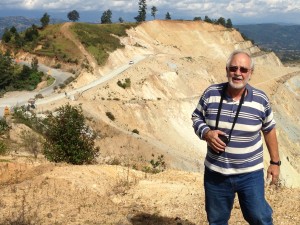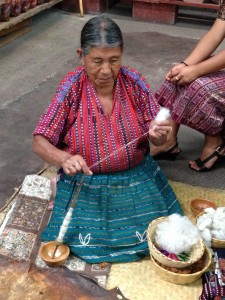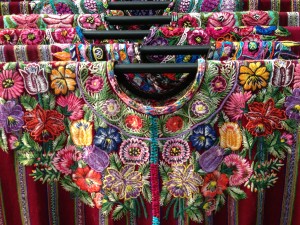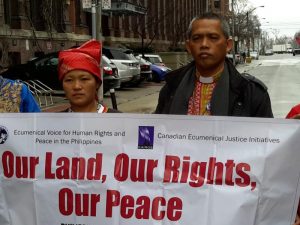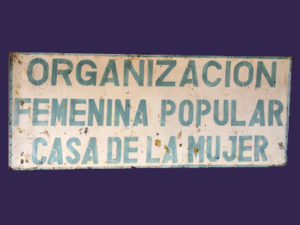A Beauty that Hurts
By Wilf Bean
Wilf Bean is a retired professor of community development at Coady International Institute and former director of the Tatamagouche Centre, a United Church adult education and retreat centre. He is a member of Sharon United Church inTatamagouche, Nova Scotia.
Sunday, a day of rest, a day of “playing tourist” in the beautiful old capital of Antigua. No need to wake up early, but I do anyhow and walk the few blocks from our hotel to the Parque Central. While sipping my coffee, a young boy offers to shine my shoes; a woman in her traditional traje approaches to sell scarves and jewelry. Nearby, two older men – probably my age or younger – are stuffing away the blankets they slept under on the sidewalk, and beginning to set out their wares – beautiful, handmade carvings and crafts. For our group, a day of rest, a day away from the intensity of hearing the stories of people’s struggles with Canadian mining companies. But the reality of the lives of the people of Guatemala has no day off. The reality of too many vendors and too few buyers is evident throughout Antigua. There is no Sunday off for many, and only a few quetzals gained at the end of a long day.
Later in the morning, our group members organize to go the various crafts markets throughout Antigua. We practice what Spanish we have and learn to bargain for our purchases. Again, the Guatemala reality is present. We hear stories from vendors who escaped the 1980s violence in their home villages by fleeing to Antigua, vendors whose parents and grandparents were “disappeared” or who had fingers cut off by the soldiers. As we walk the streets, we notice the number of soldiers patrolling the streets, complete with large rifles – an unnerving sight for many of us Canadians.
Later in the afternoon, we gather at our hotel to show our purchases – many of us confessing we bought more than we had intended of the beautiful, hand-made clothes, jewelry and crafts. We reflect on the contradictions we ourselves struggle with – struggling to live rightly in this world of “a beauty that hurts” as George Lovell has said.
At 4:30, our bus arrives to bring us back to Guatemala City. We slowly grind up the steep hills out of Antigua, following a dark green truck filled with young soldiers standing in the back, each with a large black rifle dangling around his neck. The brush-cut uniformed boys smile at us and try to attract the attention of the young women in our delegation as we pass. In time, as we rise out of the valley the sunset splays wildly over volcanoes on the horizon. Soon we begin the descent into Guatemala City, past the Walmart, Pollo Campero and McDonalds. The smell of smoke and exhaust invades our bus as we pass over barancos filled with corrugated-iron and cement houses spilling recklessly into the deep valleys below, their inhabitants hoping the next tropical storms won’t bring mudslides.
We arrive at our guesthouse in time for our evening meal. I feel refreshed from the day, but am filled with questions about the privileges and responsibilities I, as a Canadian, have. I’m glad to be part of this group. These are questions I have trouble facing squarely on my own without feeling overwhelmed. As a group, perhaps we can give each other strength and courage to move forward towards a world of more justice, compassion and peace.
